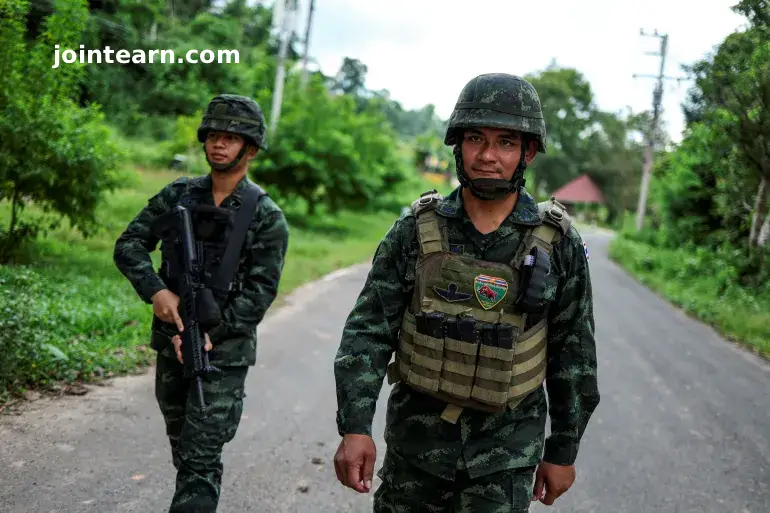
Cambodia Rejects Thai Accusations Over Border Landmine Blast
Phnom Penh, Cambodia / Bangkok, Thailand — Cambodia has firmly denied Thailand’s claims that it planted new landmines along their contested border, following an explosion that injured four Thai soldiers and prompted Bangkok to suspend a recently enhanced ceasefire agreement.
In a statement issued Tuesday, Cambodia’s Ministry of National Defence expressed “deep regret” over the incident, insisting that the blast occurred in an old minefield, a remnant of decades of conflict in the border region.
The ministry said it “categorically denies” any new mine deployment and urged Thai soldiers to avoid patrolling known mine-contaminated areas, emphasizing that communication between border troops remains open and that “the situation is calm with no further military tension reported.”
Thailand Suspends Peace Deal, Cites “Insufficient” Explanation
The Thai government, however, rejected Cambodia’s explanation, calling it “insufficient” and announcing the suspension of key elements of the October truce, including the release of 18 Cambodian prisoners of war that had been planned for Wednesday.
“What they [Cambodia] have said is not sufficient. We must see Cambodia’s stance going forward,”
said Thai Foreign Minister Sihasak Phuangketkeow, adding that Thailand will inform both the United States and Malaysia—the ASEAN chair mediating the peace process—of its decision.
Thai military officials who inspected the blast site in Sisaket province reported finding an explosion pit and three additional antipersonnel mines. The Royal Thai Army maintains that the area had been cleared and secured weeks earlier.
Thai Military: “Evidence Points to Intrusion”
Major General Winthai Suvaree, spokesperson for the Thai military, alleged that Cambodian forces may have crossed into Thai territory under the cover of darkness, removing defensive barbed wire and planting new landmines.
“The evidence led to the conclusion that intruders secretly removed the barbed wire and laid landmines in Thai territory, targeting patrol units,” Winthai told reporters, as cited by the Bangkok Post.
“The act shows Cambodia’s insincerity in reducing conflict and violates the jointly signed declaration.”
According to the army, one Thai sergeant lost his right foot, while three others sustained minor shrapnel injuries.
A Fragile Ceasefire Under Strain
The landmine blast threatens to unravel the Thailand–Cambodia peace deal, formally known as the Enhanced Truce Agreement, signed in Malaysia in October 2025 in the presence of U.S. President Donald Trump.
The accord built upon a July ceasefire brokered after five days of intense fighting that left 48 people dead and over 300,000 displaced—the most severe clash between the neighbors in recent history.
Under the enhanced truce, both sides agreed to withdraw troops and heavy artillery from contested zones and to initiate joint border patrols under ASEAN supervision.
Cambodia Urges Calm, Calls Landmine “Remnant of Past Wars”
Cambodian officials reiterated that the explosion was not the result of any recent military activity. The Ministry of Defence emphasized that unexploded mines from the Indochina wars and Khmer Rouge era remain scattered across the border.
“Such ordnance is a remnant of past conflicts, not a new deployment,” the statement read.
“We urge our Thai counterparts to exercise caution and coordinate demining operations rather than escalate tensions.”
Regional Mediation and Global Reaction
Neither the United States nor Malaysia, both of which played roles in brokering the peace deal, have yet commented publicly on the landmine incident.
Diplomatic observers warned that renewed hostilities could destabilize the broader Southeast Asian security landscape, especially given both countries’ participation in ASEAN’s regional defense initiatives.
Analysts have urged both sides to commit to a comprehensive border settlement that addresses long-standing disputes dating back more than a century.
“Without a clear demarcation and joint demining, sporadic clashes will continue to undermine peace efforts,” said a Southeast Asian security expert based in Singapore.
The Road Ahead: Can the Thailand–Cambodia Truce Survive?
While the ceasefire has largely held since late July, tensions remain high along the Chong Bok area, a heavily forested and disputed stretch of border.
Both governments have traded accusations of violating ceasefire terms, and regional leaders fear that the latest explosion could reignite fighting unless trust-building measures are reinstated quickly.
Observers note that the survival of the truce will depend on transparent investigations, joint demining initiatives, and continued ASEAN mediation.
Key Takeaways
- Four Thai soldiers injured in a landmine blast near the Thailand–Cambodia border.
- Cambodia denies planting new mines, calling them relics of past wars.
- Thailand suspends its peace deal commitments and demands further explanation.
- The Enhanced Ceasefire Agreement, signed in October 2025, now faces collapse.
- Regional and global powers, including the U.S. and ASEAN, are monitoring the situation closely.


Leave a Reply